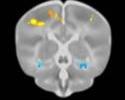New research has found that the white matter brain abnormalities found in people after concussion are similar to those found in early Alzheimer’s.
The findings suggest that the first traumatic event that causes traumatic brain injuries (mTBI) or concussion can result in a pattern of degenerative changes in the brain which lead to symptoms similar to the degenerative changes found in Alzheimer’s.
White matter vs. gray matter
White matter in the brain consists of long, finger-like fibers that come out of nerve cells and are covered by a whitish fatty material. Gray matter is without the fatty covering and contains our knowledge.
White matter connects different areas of gray matter permitting these areas to communicate. Researchers wondered whether there was a relationship between white matter injury patterns and the levels of post-concussion symptoms in mTBI patients. They used an advanced MRI technique to find out.
"In the past, we believed that patients with mTBI have symptoms because of abnormalities secondary to the initial injury," said Saeed Fakhran, MD, assistant professor of radiology at the University of Pittsburgh. "Our preliminary findings suggest that the initial event causing the concussion is like lighting a fuse, acting as a trigger for a sequence of degenerative changes resulting in patient symptoms that could potentially be prevented."
Similar symptoms in early Alzheimer’s and concussion
Similarities between Alzheimer’s and mTBI symptomology include sleep-wake disturbances, noise and hearing abnormalities, inability to focus on important sound, and memory issues. These symptoms impact quality of life and productivity, and they can cause social dysfunction.
More effective treatment for both diseases
"For this study, we looked back, analyzing images of injuries," Fakhran explained. "In further research we hope to recruit patients immediately after their injury and watch brain changes as they occur over time.
"The first step in developing a treatment for any disease is understanding what causes it, and if we can prove a link, or even a common pathway, between mTBI and Alzheimer’s it could potentially lead to effective treatment strategies for both diseases."
Source: MedicalNewsToday, Radiology








